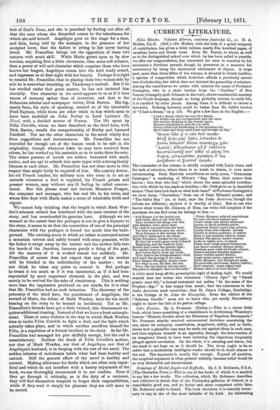CURRENT LITERATURE.
Folia Silvulce. Volunzen Alterum, continens fasciculos iii., iv. H. A. Holden, LL.D. (Bell.)—Dr. Holden, with the help of a great company of contributors, has given a thick volume, nearly five hundred pages, of excellent Latin and Greek verse- Even Mr. Farrar, to whom, as well as to the distinguished school over which he has been called to preside, we offer our congratulation, has consented for once to sanction by his. assistance a frivolous pursuit, though he preserves in a measure his consistency by using the unclassical adornment of rhyme. A large part, more than three-fifths of the volume, is devoted to Greek iambics,. a species of composition which doubtless affords a peculiarly severe test of scholarship, but which does not interest the generality of scholars. Among the contributors we notice with interest the name of Professor Conington, who in a short version from the " Catiline " of Ben Jenson (strangely spelt Johnson in the text), shows considerable mastery of the Greek language, though as being probably written in early life, it is excelled by other pieces. Among these it is difficult to choose a favourite. Nothing, however, could be better than Mr. Jebb's version. of "I had a dream," on p. 124. We give a few lines in the English :— " I had a dream which was not all a dream,
The bright sun was extinguished, and the stars Did wander darkling in the eternal space, Rayless and pathless, and the icy earth Swung blind and blackening in the moonless air ; Morn came and went—and came and brought no day."
'Overpov lioov a rl zax Asa; vrpocr;iv• (1)X4 hXiou ;Orr, ,;v2■.a1+^dve di Ix6rov Bcdopc6g= adrpa grwrcipzio vier "Acca6p', ecSou;c6X7jra- yij d' IcrcitXXEro KpueraXXocrg Xal? oio /zip% Vivre TopLn, r.EXcciPwOcio.cc• 9aniapoc d' Val; AtEPSoicnv oti 1.1YEllrEte 121.csioF'uv.
The remainder of the volume is chiefly occupied with Latin verse, ancl the task of selection, where there is so much to charm, is even more embarrassing. Dean Merivale contributes an early poem, " Dasmonum. Catalogus," a rendering of Milton's " Say, Muse, their names then known ; who first, who last," which shows the same splendid versifica- tion with which he has made us familiar.—Mr.Jebls gives us in beautiful alcaics "Dost thou look back on what hath been?" of Professor Conington's we have these, " Carwallon," from one of Dean Milman's poems ; and " The Sailor Boy " (so, at least, says the index Auctorum, though the initials are different ; anyhow it is worthy of him). But no one who knows what verses Mr. Johnson, of Eton, can write will complain if the specimen we can find room for belongs to him :— A critic must keep all the prescriptive right of finding fault. We would. remark that one writer who translates "Cherry ripe!" by " Cerasi prassto Bunt tibi," a formal statement not unlike "In the name of the Prophet—figs !" is less happy than usual ; that the references in the Index Auctorum need correction ; that St. John's College, Cambridge, is the College of St. John the Evangelist. Even the editors of the " Sabrinm Corolla " seem not to know this, yet surely Shrewsbury ought to know the title of its patron college. " Sad Hesper o'er the buried sun And ready, thou to die with him Thou watchest all things ever dim And dimmer, and a glory done. The team is loosened from the wain, The boat is drawn upon the shore ; Thou listenest to the closing door, And life is darkened in the brain. Bright Phosphor, fresher for the night, By thee the world's great work is heard Beginning, and the wakeful bird; Behind thee comes the greater light; The market boat is on the stream, And voices hail it from the brink ; Thou hear'st the village-hammer clink, And see'st the moving of the team. Sweet Hesper-Phosphor, double name For what is one, the fire, the last, Thou, like my present and my past, Thy place is changed; thou art the same." " Tristis Hespere, soils ad sepulchrum Tn cum sole mori paratus ipse Cernis omnia jam minus minusque Lucere, et decus aetheris perire. Plaustrum linquit equus jugo solutus. Cymba littus arat reducta: portam Claudit to domus audiente, et umbra Mans et vita, hominis subacta cessat Pulcher Phosphore, laetior renatus Audis et vigiles ayes, et urbem Prima voce virum procul frementem. Lux major sequitur, diesque plena: Cymbam quae vehit ad forum colons,_ Stantes margins fluminis salutant Senile verbera, mallet fabrilis, Jungi cernis equos, rotasque volvi. Dulcis Hespere, sive Phosphors sudis, Sic quod sum, quod eram, duplex videturt- Moto tempora ; tuque regna caeli Mutans unus es in locis duobus."






























 Previous page
Previous page